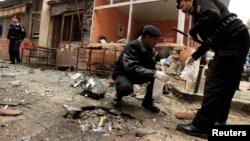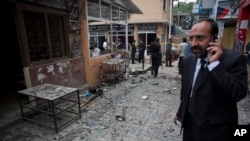ISLAMABAD —
Pakistan’s prime minister, Nawaz Sharif, huddled with top military and government officials Tuesday to hammer out a security strategy following a complex terrorist attack in the capital that left 11 dead and two dozen wounded.
Eyewitnesses to Monday’s gun, grenade and suicide bomb attack on a courthouse in a busy shopping area in central Islamabad said police were not able to protect the victims from the militants.
Security analysts have said that an effective police force was critical to fighting the country’s violent insurgency.
A former inspector-general of the police, who asked to go only by the name Ahmed, said the police had the experience, but not the capacity to counter such threats.
“Unless the government of Pakistan and the provincial governments of Pakistan come very heavily to prepare the police in terms of their capacity building, it will become difficult for the police to come to the expectations of the Pakistan community, the nation, and to the international community as well,” he said.
Seeking to reassure the public, Information Minister Pervaiz Rashid said on Tuesday the government was in the process of importing bomb disposal vehicles, and boosting its defenses against urban terrorism.
According to state-run media, there were 47 police on duty at the time. One died in the bombing.
Interior Minister Chaudhry Nisar Ali Khan on Monday admitted the city’s police were not ready to deal with terrorist attacks.
He said Pakistan’s armed forces were trained and motivated against this kind of warfare, but its police and civil armed forces were not trained for this kind of warfare.
The bloody attack came just two days after the Tehreek-e-Taliban alliance of militant groups declared a cease-fire in order to restart peace talks with the government.
The assault, claimed by an extremist faction defying the Taliban’s call for a cease-fire, targeted a crowded courtroom, a symbol of the country’s legal system. Most of those killed were lawyers and judges.
Supreme Court Justice Tassaduq Hussain Jilani said the attack would not weaken the system.
"Our path on the rule of law will continue, there will be no impact on that," adding he prayed for all the lives targeted in the terrorist attack.
The Supreme Court has formed a committee to investigate the incident, and has demanded a full police report.
Lawyers around the country are on strike to protest the attack.
Ahmed said even if Monday’s attack was aimed at sending a particular message to the government, more attacks were possible.
“Even if there is a splinter group, one or two, which there seem to be there, we will have to be extremely careful, and you know, sort of will have to be prepared for this kind of situations,” he said.
U.S. Ambassador to Pakistan Richard Olson on Tuesday condemned the attack as a “despicable act of terrorism” and extended his condolences to the families of the victims.
Eyewitnesses to Monday’s gun, grenade and suicide bomb attack on a courthouse in a busy shopping area in central Islamabad said police were not able to protect the victims from the militants.
Security analysts have said that an effective police force was critical to fighting the country’s violent insurgency.
A former inspector-general of the police, who asked to go only by the name Ahmed, said the police had the experience, but not the capacity to counter such threats.
“Unless the government of Pakistan and the provincial governments of Pakistan come very heavily to prepare the police in terms of their capacity building, it will become difficult for the police to come to the expectations of the Pakistan community, the nation, and to the international community as well,” he said.
Seeking to reassure the public, Information Minister Pervaiz Rashid said on Tuesday the government was in the process of importing bomb disposal vehicles, and boosting its defenses against urban terrorism.
According to state-run media, there were 47 police on duty at the time. One died in the bombing.
Interior Minister Chaudhry Nisar Ali Khan on Monday admitted the city’s police were not ready to deal with terrorist attacks.
He said Pakistan’s armed forces were trained and motivated against this kind of warfare, but its police and civil armed forces were not trained for this kind of warfare.
The bloody attack came just two days after the Tehreek-e-Taliban alliance of militant groups declared a cease-fire in order to restart peace talks with the government.
The assault, claimed by an extremist faction defying the Taliban’s call for a cease-fire, targeted a crowded courtroom, a symbol of the country’s legal system. Most of those killed were lawyers and judges.
Supreme Court Justice Tassaduq Hussain Jilani said the attack would not weaken the system.
"Our path on the rule of law will continue, there will be no impact on that," adding he prayed for all the lives targeted in the terrorist attack.
The Supreme Court has formed a committee to investigate the incident, and has demanded a full police report.
Lawyers around the country are on strike to protest the attack.
Ahmed said even if Monday’s attack was aimed at sending a particular message to the government, more attacks were possible.
“Even if there is a splinter group, one or two, which there seem to be there, we will have to be extremely careful, and you know, sort of will have to be prepared for this kind of situations,” he said.
U.S. Ambassador to Pakistan Richard Olson on Tuesday condemned the attack as a “despicable act of terrorism” and extended his condolences to the families of the victims.










